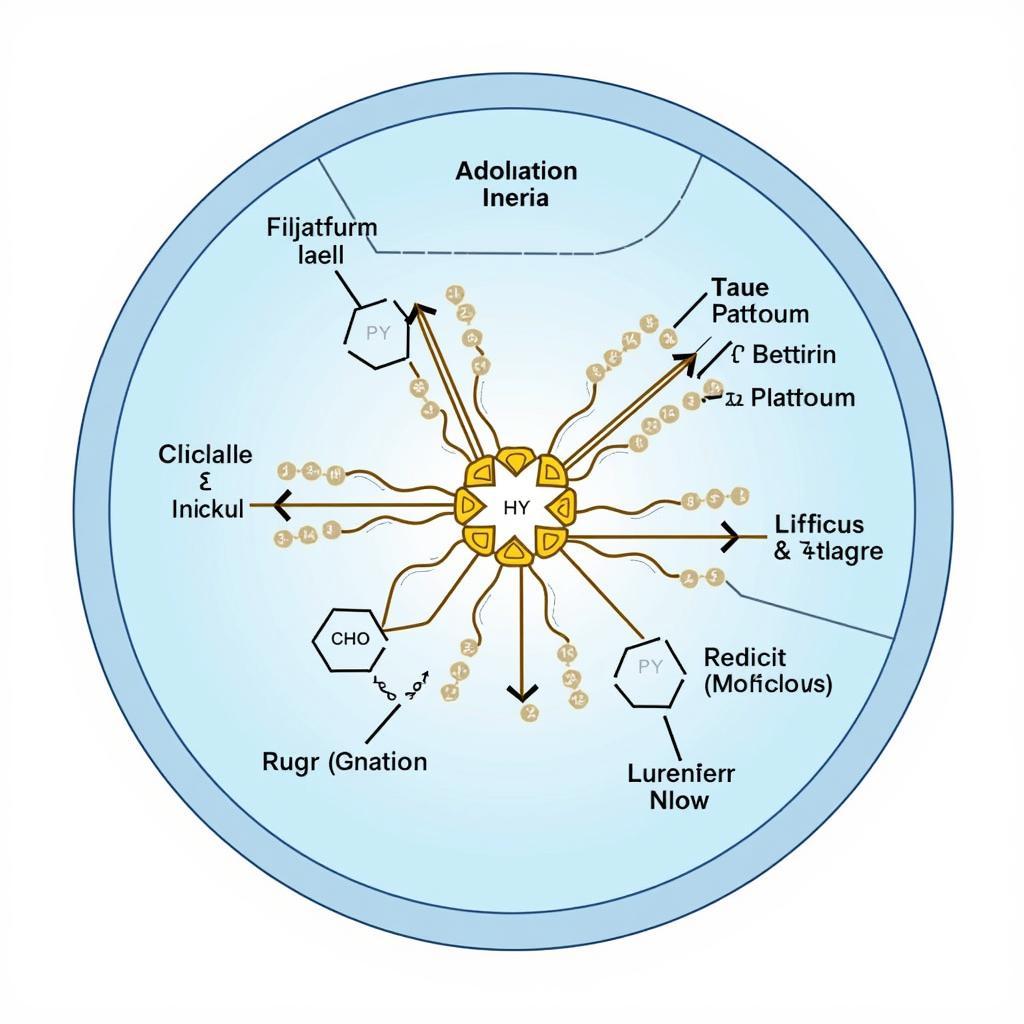Asea Liquid has garnered attention in recent years, sparking curiosity and debate surrounding its purported benefits. This article delves into the science behind ASEA liquid, exploring its composition, proposed mechanisms of action, and the existing research on its potential effects. We’ll also address the controversies surrounding ASEA liquid, examining both the perspectives of proponents and critics.
What is ASEA Liquid?
ASEA liquid is marketed as a “redox signaling supplement,” claiming to contain bio-active molecules similar to those naturally produced by the body’s cells. According to the manufacturer, these molecules play a crucial role in cellular communication and maintaining overall health. ASEA’s key ingredient is a saline solution that undergoes a patented electrolysis process, which the company claims creates these beneficial signaling molecules.
 Redox Signaling Pathway in a Cell
Redox Signaling Pathway in a Cell
Understanding Redox Signaling
Redox signaling is a fundamental process within the human body. It involves the transfer of electrons between molecules, influencing cell signaling pathways that regulate various biological functions, including:
- Immune Response: Redox signaling helps the immune system identify and target pathogens.
- Cellular Repair: It facilitates the repair of damaged cells and tissues.
- Antioxidant Defense: Redox signaling contributes to the body’s natural antioxidant system, protecting against free radical damage.
Proponents of ASEA liquid suggest that consuming their product supplements the body’s natural redox signaling molecules, potentially enhancing these vital functions.
The Science Behind ASEA Liquid: Claims vs. Evidence
ASEA’s claims have been met with both enthusiasm and skepticism. While the company cites scientific studies to support their product’s efficacy, the available research is limited and subject to scrutiny.
- Limited Independent Research: Much of the research on ASEA liquid is funded by the company itself, raising concerns about potential bias. Independent studies are scarce.
- Mechanism of Action: The exact mechanism by which ASEA liquid’s purported redox signaling molecules exert their effects remains unclear. Further research is needed to understand how these molecules interact with human cells.
- Long-Term Effects: There is a lack of long-term studies investigating the potential benefits and risks of consuming ASEA liquid over extended periods.
Addressing the Controversy
ASEA liquid has faced criticism, with some labeling it as a “pseudoscientific” product. Critics argue that the scientific evidence supporting its benefits is insufficient and that the company’s marketing claims are exaggerated. They point to the lack of rigorous, peer-reviewed studies demonstrating ASEA’s effectiveness for the health conditions it claims to address.
However, ASEA maintains that their product is safe and beneficial, backed by their own research and anecdotal evidence from users. They emphasize the importance of personal experience and encourage individuals to try ASEA liquid for themselves.
 ASEA Liquid Clinical Trial
ASEA Liquid Clinical Trial
Making an Informed Decision
The decision of whether or not to try ASEA liquid is a personal one. Given the limited scientific evidence and ongoing controversy, it’s crucial to approach such products with a critical and informed mindset.
- Consult Healthcare Professionals: Before incorporating ASEA liquid or any new supplement into your routine, consult with your doctor or a qualified healthcare provider. They can help you assess potential risks and benefits based on your individual health status and medical history.
- Independent Research: Conduct your own research from reputable sources beyond the information provided by the company itself. Look for peer-reviewed studies and evidence-based information to form a balanced perspective.
- Realistic Expectations: Approach claims of health benefits with a healthy dose of skepticism. While some individuals may experience positive results, it’s essential to remember that individual responses to supplements can vary.
asean 3 bond market guide 2016 singapore
Conclusion
ASEA liquid remains a topic of debate, with ongoing discussions about its efficacy and scientific validity. While the concept of redox signaling holds promise in understanding cellular health, further independent research is needed to determine the true potential and limitations of ASEA liquid. Consumers should approach such products with careful consideration, consulting healthcare professionals and making informed decisions based on available evidence and their individual health needs.
FAQs
1. What is ASEA liquid made of?
ASEA liquid is a saline solution that has undergone a patented electrolysis process. The company claims this process creates bio-active molecules similar to those involved in cellular redox signaling.
2. Are there any side effects of ASEA liquid?
ASEA liquid is generally considered safe for consumption. However, some individuals may experience mild, temporary side effects, such as headaches or digestive discomfort.
3. Where can I buy ASEA liquid?
ASEA liquid is primarily sold through the company’s website and independent distributors.
4. Is ASEA liquid FDA approved?
ASEA liquid is marketed as a dietary supplement and is not subject to FDA approval.
5. What are the potential benefits of redox signaling molecules?
Redox signaling molecules play a role in various cellular processes, including immune response, cellular repair, and antioxidant defense.
6. Can ASEA liquid cure diseases?
ASEA liquid is not intended to diagnose, treat, cure, or prevent any disease.
7. How much ASEA liquid should I drink per day?
The recommended daily serving size of ASEA liquid is typically 2-4 ounces.
Need Help?
For further assistance and support, please reach out to us:
- Phone Number: 0369020373
- Email: [email protected]
- Address: Thon Ngoc Lien, Hiep Hoa, Bac Giang, Vietnam
Our dedicated customer service team is available 24/7 to assist you.


